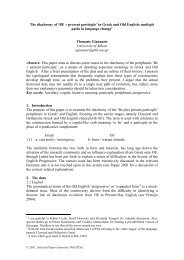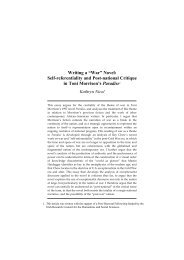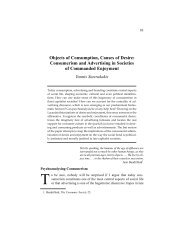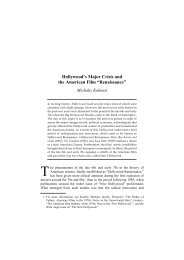19 International Symposium on Theoretical and Applied Linguistics ...
19 International Symposium on Theoretical and Applied Linguistics ...
19 International Symposium on Theoretical and Applied Linguistics ...
Create successful ePaper yourself
Turn your PDF publications into a flip-book with our unique Google optimized e-Paper software.
G E N E R A L S E S S I O N<br />
(1) watch > analog watch, mail > snail mail, weap<strong>on</strong> > c<strong>on</strong>venti<strong>on</strong>al weap<strong>on</strong>, etc.<br />
There has been very little discussi<strong>on</strong> of the phenomen<strong>on</strong> in the literature <strong>and</strong> of the structure <strong>and</strong><br />
functi<strong>on</strong> of the mechanism that creates retr<strong>on</strong>yms. All available analyses more or less agree that in<br />
pairs like the <strong>on</strong>es in (1) above a general term (first member of the pair) is renamed to become more<br />
specific (sec<strong>on</strong>d member of the pair) because of the appearance of a new term that is coined in order<br />
to name a new inventi<strong>on</strong> or discovery, c<strong>on</strong>ceptually related to the old <strong>on</strong>e (see e.g. Ahmad &<br />
Collingham <str<strong>on</strong>g>19</str<strong>on</strong>g>96: 762-763, Anastasiadi-Syme<strong>on</strong>idi 2001: 68-69, Xydopoulos 2008: 164-165):<br />
(2) digital watch >> watch >> analog watch<br />
As shown in (2), the inventi<strong>on</strong> of “watches that display time in digits” led to the coinage of the term<br />
digital watch. The new term is the reas<strong>on</strong>, or else the (retr<strong>on</strong>ymy) instigator, for watch to become more<br />
specific with the additi<strong>on</strong> of a modifier that will differentiate it from the new term (i.e. analog as<br />
opposed to digital).<br />
In this paper, exp<strong>and</strong>ing <strong>on</strong> the available analyses, I view retr<strong>on</strong>ymy as a subcase of hyp<strong>on</strong>ymy<br />
<strong>and</strong> oppositeness relati<strong>on</strong>s, <strong>on</strong> the basis of Cruse <str<strong>on</strong>g>19</str<strong>on</strong>g>86: 136 ff analysis of hyp<strong>on</strong>ymy <strong>and</strong><br />
incompatibility, <strong>and</strong> make the following claims:<br />
• I underst<strong>and</strong> the two members of the retr<strong>on</strong>ymic pair, like in (1) above, as representing the<br />
hierarchical relati<strong>on</strong> of the superordinate <strong>and</strong> the subordinate term in hyp<strong>on</strong>ymy (cf.<br />
tax<strong>on</strong>ymy).<br />
• The new term, the so-called “retr<strong>on</strong>ymy instigator” is coined in such a way as to be<br />
incompatible with the modified old term.<br />
• Both the modified old term <strong>and</strong> the new term are co-hyp<strong>on</strong>yms of the, hypernymic, old term<br />
which, in its turn, has become an autohyp<strong>on</strong>ym.<br />
• Retr<strong>on</strong>yms appear in the source-language (mostly in English) <strong>and</strong> are transferred to other<br />
languages as loanwords/calques.<br />
Finally, <strong>on</strong> the basis of these claims I underst<strong>and</strong> the (recurring) mechanism that creates retr<strong>on</strong>yms<br />
as involving three phases that can be described as follows:<br />
(a) Creati<strong>on</strong> of a hyp<strong>on</strong>ym to name a new c<strong>on</strong>cept <strong>on</strong> the basis of its basic difference with the<br />
old c<strong>on</strong>cept: e.g. digital watch: “type of display” as the basic difference (cf. retr<strong>on</strong>ymy<br />
instigator) from watch.<br />
(b) Transformati<strong>on</strong> of the old term into an autohyp<strong>on</strong>ym: e.g. watch (meaning either “any watch”<br />
(generic) or “analog watch” (specific)).<br />
(c) Modificati<strong>on</strong> of the old term is modified with the additi<strong>on</strong> of an ant<strong>on</strong>ymic adjective (referring<br />
to the basic difference) to create a new incompatible co-hyp<strong>on</strong>ymic term: e.g. analog watch.<br />
Key references<br />
Ahmad, K. & Collingham, S. <str<strong>on</strong>g>19</str<strong>on</strong>g>96. Renewable Terminology. In M. Gellerstam et al (eds.) EURALEX '96: Proc. I-II,<br />
Part II - Papers submitted to the Seventh EURALEX <str<strong>on</strong>g>Internati<strong>on</strong>al</str<strong>on</strong>g> C<strong>on</strong>gress <strong>on</strong> Lexicography in Göteborg,<br />
Sweden. Göteborg: Göteborg University, Sweden, 759-771.<br />
Anastasiadi-Syme<strong>on</strong>idi, A. 2001. Rebaptism. In Hellenic Language <strong>and</strong> Terminology 3 rd C<strong>on</strong>ference Papers.<br />
Athens: Hellenic Society for Terminology, 63-77<br />
Cruse, A. <str<strong>on</strong>g>19</str<strong>on</strong>g>86. Lexical Semantics. Cambridge: Cambridge University Press.<br />
Fromkin, V., R. Rodman & Hyams, N. 2003. An Introducti<strong>on</strong> to Language (7 th Editi<strong>on</strong>). Bost<strong>on</strong>, MA: Thoms<strong>on</strong>.<br />
Xydopoulos, G. J. 2008. Lexicology: Introducti<strong>on</strong> to the analysis of the word <strong>and</strong> the lexic<strong>on</strong>. Athens: Patakis.<br />
The status of Russian as an intracommunal language<br />
within the P<strong>on</strong>tic Greek community in Cyprus<br />
Di<strong>on</strong>ysios Zoumpalidis<br />
University of Cyprus<br />
denispace@hotmail.com<br />
The status of a particular language can be seen in terms of the frequency it is used for communicati<strong>on</strong><br />
purposes within a particular speech community. The status of the Russian language within the P<strong>on</strong>tic<br />
Greek community in Cyprus is rather vague today. The majority of P<strong>on</strong>tic Greeks, who grew up <strong>and</strong><br />
lived in the area of Caucasus, in Russia as well as in other parts of the former Soviet Uni<strong>on</strong>, have<br />
Russian as their dominant language since it was the language of administrati<strong>on</strong> <strong>and</strong> educati<strong>on</strong>. Having<br />
moved to Cyprus in early <str<strong>on</strong>g>19</str<strong>on</strong>g>90s, P<strong>on</strong>tic Greeks started learning St<strong>and</strong>ard Modern Greek (SMG), <strong>and</strong><br />
to a lesser extent the Cypriot Greek dialect, as in their majority they identify themselves as “Greeks”.<br />
The formal educati<strong>on</strong> in Cyprus, where the language of instructi<strong>on</strong> is SMG, presents an opportunity to<br />
younger P<strong>on</strong>tic Greeks to learn SMG as a sec<strong>on</strong>d (or even as a first) language.<br />
The present paper investigates the current status of the Russian language as it is reflected in<br />
interacti<strong>on</strong>s am<strong>on</strong>g P<strong>on</strong>tic Greeks who live permanently in Cyprus. Russian, which is seen as a<br />
<str<strong>on</strong>g>19</str<strong>on</strong>g> th ISTAL 62






